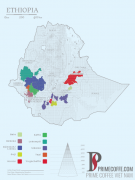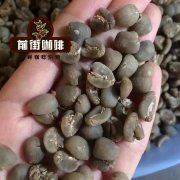Impact of Ethiopian Commodity Trading Exchange ECX on Coffee Export quality | Coffee bean value chain
The coffee atmosphere in Ethiopia is very strong. His unique geographical environment and climatic conditions make the coffee taste wonderful. Rich, the depth, width and breadth of the flavor are among the best.
As the oldest coffee drinker, how did Ethiopia grow into a huge coffee empire? This is closely related to the Ethiopian Commodity Exchange. After the establishment of the Ethiopia Mercantile Exchange in 2008, information such as more traditional regions, emerging production areas and local warehousing distribution centers has rearranged the classification of contract trading and production areas: small production areas contained in contract sites, designated areas and coffee century production areas must be linked. The Ethiopian Commodity Exchange also provides information on the processing and storage of boutique coffee. So how does he work? Let's let the editor give you a brief introduction!

The Operation Mode of Ethiopia Commodity Exchange and the whole Coffee value chain
The operating system of the Ethiopian Commodity Exchange: farmers, cooperatives and businessmen bring Shell beans to the → sub-station of the exchange to mark the initial quality and weight of the → return to the exchange; the buyer must first have a guaranteed account in the exchange → to see the supply list to subbid.
The operation process of the overall trading value chain of the exchange and large cooperatives, private farms and boutique direct trade (DST) system: all exported coffee must go through the regional exchange office to confirm its quality and weight before it can be shipped to the capital and the next transaction, and must be sent to the coffee cup quality testing and appraisal center (CLU) for final quality appraisal or sampling inspection before bagging and export. The new announcement in 2017 reopens the direct sale of boutique batches and marks the information that can identify the source of production. Italian buyers consult the information of the washing station at the source after buying raw beans, but it is still difficult to solve the problem of opaque information encountered by international buyers in the search for beans.
Fortunately, there has been a major change in this rule since 2017. The Ethiopian Prime Minister's office worked hard to adjust policy and cater to the trend, and the announcement No. 1051 issued by the Exchange in 2017 excited the global boutique coffee circle. A small amount of boutique coffee that can be traced back to the source can be traded again, but it must be noted before placing an order that although coffee can be purchased directly, after the batch is ready and samples are retained, if the contract is not fulfilled within three days, the batch still needs to be traded through the Ethiopian Commodity Exchange.
Frankly, there is nothing wrong with the trading model of the Ethiopian Mercantile Exchange. His method of intimidating the brokers who buy fruit in the producing area has become ineffective. Coffee exports account for 25% of Ethiopia's foreign exchange earnings, and the reform measures proposed by the government have long been beneficial to the industrial environment, and after fine-tuning, it will help bean hunters of various countries to look for good goods.
The basic information such as the variety and origin of coffee beans can be clearly seen from the ECX contract below.

Buyers in the exchange platform can only see the logo of the trading area, can not achieve anitry preeved (referred to as IP), for boutique coffee buyers IP is a necessary information, international buyers usually pay a higher price to identify the source of high-quality coffee. Now that coffee exporters finally have the opportunity to sell IP coffee to foreign buyers, the new system is worth applauding for achieving a win-win situation for both buyers and farmers.
Important Notice :
前街咖啡 FrontStreet Coffee has moved to new addredd:
FrontStreet Coffee Address: 315,Donghua East Road,GuangZhou
Tel:020 38364473
- Prev

Coffee producing country Ethiopia | what is the grade standard of fine coffee beans G1 Q1 and its new rules
Ethiopia has always been a big coffee country, where thousands of coffee trees are planted. She is not only the treasure of coffee, but also the moonlight in the hearts of many coffee lovers. With regard to the grading of raw beans in Ethiopia, let's study the following: the grading of the Ethiopian Coffee Bureau is based on the cup test and the quality of raw beans: first, the quality of the cup test: according to the cleanliness of raw beans
- Next

Auction is the main means of coffee trading in Kenya | introduction to the historical development story of Kenyan coffee beans by NCE
Auctions may be one of the most complex and inefficient ways to complete a coffee transaction. But he was one of the first methods used in the coffee trade. Today, it is still the main method of buying coffee from countries such as Kenya and Tanzania and plays an important role in promoting high-quality microbatches. In the best case, it can also be used as a way to find excellent bakers and producers.
Related
- Detailed explanation of Jadeite planting Land in Panamanian Jadeite Manor introduction to the grading system of Jadeite competitive bidding, Red bid, Green bid and Rose Summer
- Story of Coffee planting in Brenka region of Costa Rica Stonehenge Manor anaerobic heavy honey treatment of flavor mouth
- What's on the barrel of Blue Mountain Coffee beans?
- Can American coffee also pull flowers? How to use hot American style to pull out a good-looking pattern?
- Can you make a cold extract with coffee beans? What is the right proportion for cold-extracted coffee formula?
- Indonesian PWN Gold Mandrine Coffee Origin Features Flavor How to Chong? Mandolin coffee is American.
- A brief introduction to the flavor characteristics of Brazilian yellow bourbon coffee beans
- What is the effect of different water quality on the flavor of cold-extracted coffee? What kind of water is best for brewing coffee?
- Why do you think of Rose Summer whenever you mention Panamanian coffee?
- Introduction to the characteristics of authentic blue mountain coffee bean producing areas? What is the CIB Coffee Authority in Jamaica?

